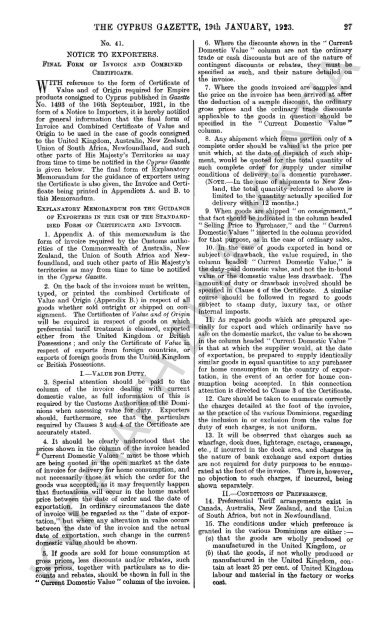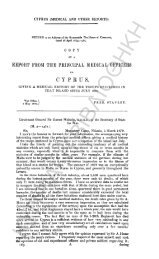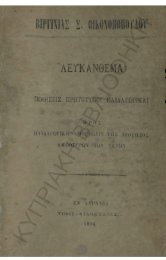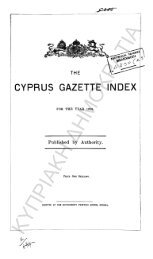- Page 1 and 2: .1 i'•• . - l ."
- Page 3 and 4: y/li'''^J^Z£.\ 9'0THE,-5» ,^%v^l.
- Page 5: THE CYPRUS GAZETTE INDEX, 1923.APPO
- Page 8: MEDICAL—continued.HOSPITALS. Acco
- Page 11 and 12: The Cyprus Gazette.(EXTRAORDINARY.)
- Page 13: The Cyprus Gazette(Published by Aut
- Page 17 and 18: THE CYPRUS QAZETTE, 5th JANUARY, 19
- Page 20 and 21: 10 THE CYPRUS GAZETTE, 5th JANUARY,
- Page 22 and 23: Nf. 459A in Claas 45. in reapeci
- Page 24 and 25: ΚΥΠΡΙΑΚΗ ΔΗΜΟΚΡΑΤΙ
- Page 26 and 27: ΚΥΠΡΙΑΚΗ ΔΗΜΟΚΡΑΤΙ
- Page 28 and 29: Ig THE CYPRUS GAZETTE (EXTRAORDINAR
- Page 30 and 31: Short title.Amendmentof Law X. of19
- Page 32 and 33: Short title.Amendmentof LawXVIII. o
- Page 34 and 35: 24 rHE CYPRUS GAZETTE, 19th JANUARY
- Page 38 and 39: 28 THE CYPRUS GAZETTE, 19th JANUARY
- Page 40 and 41: 30 THK YPRUS GAZETTE, 19th JANUARY,
- Page 42 and 43: 32 THE CYPRUS GAZETTE, 19th JANUARY
- Page 44 and 45: ΚΥΠΡΙΑΚΗ ΔΗΜΟΚΡΑΤΙ
- Page 46 and 47: ΚΥΠΡΙΑΚΗ ΔΗΜΟΚΡΑΤΙ
- Page 48 and 49: 38 THE CYPRUS GAZETTE (EXTBAOSDINAR
- Page 50 and 51: 40 THE CYPRUS GAZETTE (EXTRAORDINAR
- Page 52 and 53: ΚΥΠΡΙΑΚΗ ΔΗΜΟΚΡΑΤΙ
- Page 54 and 55: ΚΥΠΡΙΑΚΗ ΔΗΜΟΚΡΑΤΙ
- Page 56 and 57: 46 THE CYPRUS GAZETTE, 2nd FEBRUARY
- Page 58 and 59: 48 THE GYPRUS GAZETTE, 2nd FEBRUARY
- Page 60 and 61: 50 THE CYPRUS GAZETTE, 2nd FEBRUARY
- Page 62 and 63: 52 THE CYPRUS GAZETTE, 2nd FEBRUARY
- Page 64 and 65: ΚΥΠΡΙΑΚΗ ΔΗΜΟΚΡΑΤΙ
- Page 66 and 67: 56 THE CYPRUS GAZETTE, 16th FEBRUAR
- Page 68 and 69: 58 THE CYPRUS GAZETTE. 16th FEBRUAR
- Page 70 and 71: 60 THE CYPRUS GAZETTE, 16th FEBRUAR
- Page 72 and 73: 62 THE CYPRUS GAZETTE, 16th FEBRUAR
- Page 74 and 75: 61 THE CYPRUS GAZETTE, 16th FEBRUAR
- Page 76 and 77: 66 THE CYPRUS GAZETTE, 16th FEBRUAR
- Page 78 and 79: 68 THE CYPRUS GAZETTE, 16th FEBRUAR
- Page 80 and 81: 70 THE CYPRUS GAZETTE, 16th FEBRUAR
- Page 82 and 83: Short tiile.Amendmentof LawXVIII. o
- Page 84 and 85: ΚΥΠΡΙΑΚΗ ΔΗΜΟΚΡΑΤΙ
- Page 86 and 87:
ΚΥΠΡΙΑΚΗ ΔΗΜΟΚΡΑΤΙ
- Page 88 and 89:
78 THE CYPRUS GAZETTE, 2nd MARCH, 1
- Page 90 and 91:
SO THE CYPRUS GAZETTE, 2nd MARCH, 1
- Page 92 and 93:
82 THE CYPRUS GAZETTE, 2nd MARCH, 1
- Page 94 and 95:
84 THE CYPRUS GAZETTE, 2iid MARCH,
- Page 96 and 97:
86 THE CYPRUS GAZETTE, 2nd MARCH, 1
- Page 98 and 99:
88 THE CYPRUS GAZETTE, 2nd MARCH, 1
- Page 100 and 101:
90 THE CYPRUS GAZETTE, 2nd MARCH, 1
- Page 102 and 103:
ΚΥΠΡΙΑΚΗ ΔΗΜΟΚΡΑΤΙ
- Page 104 and 105:
Xo. 473A in Class 47, in respect of
- Page 106 and 107:
^6 THE CYPRUS GAZETTE, 16th MARCH,
- Page 108 and 109:
^8 THE CYPRUS GAZETTE, 16th MARCH,
- Page 110 and 111:
100 THE CYPRUS GAZETTE, 16th MARCH,
- Page 112 and 113:
102 THE CYPRUS GAZETTE, 16th MARCH,
- Page 114 and 115:
104 THE CYPRUS GAZETTE, 16th MARCH,
- Page 116 and 117:
106 THE CYPRUS GAZETTE, 16th MARCH,
- Page 118 and 119:
No. 473A in Class 47, in respect of
- Page 120 and 121:
ΚΥΠΡΙΑΚΗ ΔΗΜΟΚΡΑΤΙ
- Page 122 and 123:
ΚΥΠΡΙΑΚΗ ΔΗΜΟΚΡΑΤΙ
- Page 124 and 125:
114 THE CYPRUS GAZETTE, SOth MARCH,
- Page 126 and 127:
116 THE CYPRUS GAZETTE, SOth MARCH,
- Page 128 and 129:
118 THE CYPRUS GAZETTE, 30th MARCH,
- Page 130 and 131:
120 THE CYPRUS GAZETTE, 30tli MARCH
- Page 132 and 133:
ΚΥΠΡΙΑΚΗ ΔΗΜΟΚΡΑΤΙ
- Page 134 and 135:
ΚΥΠΡΙΑΚΗ ΔΗΜΟΚΡΑΤΙ
- Page 136 and 137:
126 THE CYPRUS GAZETTE, 13th APRIL,
- Page 138 and 139:
128 THE CYPRUS GAZETTE. 13th APRIL,
- Page 140 and 141:
ΚΥΠΡΙΑΚΗ ΔΗΜΟΚΡΑΤΙ
- Page 142 and 143:
PATENTS RULES CERTIFICATES.THE Regi
- Page 144 and 145:
ΚΥΠΡΙΑΚΗ ΔΗΜΟΚΡΑΤΙ
- Page 146 and 147:
ΚΥΠΡΙΑΚΗ ΔΗΜΟΚΡΑΤΙ
- Page 148 and 149:
138 THE CYPRUS GAZETTE, 27th APRIL,
- Page 150 and 151:
140 THE CYPRUS GAZETTE, 27th APRIL,
- Page 152 and 153:
142 THE CYPRUS GAZETTE, 27th APRIL,
- Page 154 and 155:
PATENTS RULES CERTIFICATES.THE Regi
- Page 156 and 157:
ΚΥΠΡΙΑΚΗ ΔΗΜΟΚΡΑΤΙ
- Page 158 and 159:
Oath.Unifonn orbadge.Protectionof R
- Page 160 and 161:
Report.(e) To impound any anima fee
- Page 162 and 163:
Penalty forunlawfullyremoving,anima
- Page 164 and 165:
Miscellaneous.^^aiPo'ice 42, There
- Page 166 and 167:
Fustappointment.Subsequentappomtmen
- Page 168 and 169:
To give information to the Commissi
- Page 170 and 171:
Short title.Hi-—^or every certifi
- Page 172 and 173:
Short title.Applicationof Law.Defin
- Page 174 and 175:
Member notto exercisehis rightstill
- Page 176 and 177:
LiabiUty ofmember(2) A society may
- Page 178 and 179:
R^very of 41, Any sum awarded by wa
- Page 180 and 181:
{h) prescribe the accounts and book
- Page 182 and 183:
Power forthe HighCommissionerinCoun
- Page 184 and 185:
ΚΥΠΡΙΑΚΗ ΔΗΜΟΚΡΑΤΙ
- Page 186 and 187:
ΚΥΠΡΙΑΚΗ ΔΗΜΟΚΡΑΤΙ
- Page 188 and 189:
ΚΥΠΡΙΑΚΗ ΔΗΜΟΚΡΑΤΙ
- Page 190 and 191:
Procedureuponweighing,measuringor t
- Page 192 and 193:
Short title.Amendmentof Law 6 of1S8
- Page 194 and 195:
(3) Where a person lands in Cyprus
- Page 196 and 197:
ΚΥΠΡΙΑΚΗ ΔΗΜΟΚΡΑΤΙ
- Page 198 and 199:
Duty onwarehousedgoods.Short title.
- Page 200 and 201:
190 THE CYPRUS GAZETTE, llth MAY, 1
- Page 202 and 203:
192 THE GYPRUS GAZETTE, llth MAY, 1
- Page 204 and 205:
194 THE CYPRUS GAZETTE, llth MAY, 1
- Page 206 and 207:
196 THE GYPRUS GAZETTE, llth MAY, 1
- Page 208 and 209:
198 THK CYPRUS GAZETTE, llth MAY, 1
- Page 210 and 211:
200 THE CYPRUS GAZETTE, llth MAY, 1
- Page 212 and 213:
ΚΥΠΡΙΑΚΗ ΔΗΜΟΚΡΑΤΙ
- Page 214 and 215:
No. 482A in Class 42, in respect of
- Page 216 and 217:
ΚΥΠΡΙΑΚΗ ΔΗΜΟΚΡΑΤΙ
- Page 218 and 219:
Advocateand hisclerk maytransactbus
- Page 220 and 221:
210 THE CYPRUS GAZETTE (EXTRAORDINA
- Page 222 and 223:
212 THE GYPRUS GAZETTE (EXTRAORDINA
- Page 224 and 225:
iHlTHE CYPRUS GAZETTE (EXTRAORDINAR
- Page 226 and 227:
216 THE CYPRUS GAZETTE (EXTRAORDINA
- Page 228 and 229:
218 THE CYPRUS GAZETTE (EXTRAORDINA
- Page 230 and 231:
220 THE GYPRUS GAZETTE (EXTRAORDINA
- Page 232 and 233:
222 THE CYPRUS GAZETTE (EXTRAORDINA
- Page 234 and 235:
224 THE CYPRUS GAZETTE (EXTRAORDINA
- Page 236 and 237:
226 THE CYPRUS GAZETTE (EXTRAORDINA
- Page 238 and 239:
228 THE CVPRUS GAZETTK (KXTRAORDINA
- Page 240 and 241:
ΚΥΠΡΙΑΚΗ ΔΗΜΟΚΡΑΤΙ
- Page 242 and 243:
ΚΥΠΡΙΑΚΗ ΔΗΜΟΚΡΑΤΙ
- Page 244 and 245:
Short title.Appropria*iion of£35,7
- Page 246 and 247:
AppointmentofRegistrar.Societieswhi
- Page 248 and 249:
Registrar to 21. The Registrar or a
- Page 250 and 251:
Borrowingpowers ofsociety.Restricti
- Page 252 and 253:
Appeal.Furtherpowers ofhqoidator.En
- Page 254 and 255:
Recovery efsums dueto Government.Pr
- Page 256 and 257:
Penaltv.(2) If any person aids or a
- Page 258 and 259:
Short title.Interpretation.Municipa
- Page 260 and 261:
Weighing of^tlncfofCustomsOfficers.
- Page 262 and 263:
Short title.^fTr^"*of 1878. 'Defini
- Page 264 and 265:
Rewards.Gratuitiesand pensions.Duti
- Page 266 and 267:
Animals notclaimed.Pasturage ofanim
- Page 268 and 269:
Proviso forattendanceof RuralConsta
- Page 270 and 271:
ΚΥΠΡΙΑΚΗ ΔΗΜΟΚΡΑΤΙ
- Page 272 and 273:
ΚΥΠΡΙΑΚΗ ΔΗΜΟΚΡΑΤΙ
- Page 274 and 275:
264 THE CYPRUS GAZETTE, 25th MAY, 1
- Page 276 and 277:
266 THE CYPRUS GAZETTE, 25th MAY, 1
- Page 278 and 279:
268 THE CYPRUS GAZETTE, 26lh MAY, 1
- Page 280 and 281:
270 THE CYPRUS GAZETTE. 2cth MAY, 1
- Page 282 and 283:
No. 487A in Class 43, in respect of
- Page 284 and 285:
ΚΥΠΡΙΑΚΗ ΔΗΜΟΚΡΑΤΙ
- Page 286 and 287:
Mukhtar andcomplainantto inqjectdam
- Page 288 and 289:
Appeal4igainstorder.Order of•Cour
- Page 290 and 291:
goats made by any such owner within
- Page 292 and 293:
ΚΥΠΡΙΑΚΗ ΔΗΜΟΚΡΑΤΙ
- Page 294 and 295:
ΚΥΠΡΙΑΚΗ ΔΗΜΟΚΡΑΤΙ
- Page 296 and 297:
ΚΥΠΡΙΑΚΗ ΔΗΜΟΚΡΑΤΙ
- Page 298 and 299:
Mukhtar and 2. Subject to the provi
- Page 300 and 301:
Swearing ofMukhtar.Penalty iorrefus
- Page 302 and 303:
High Commissionermay alterboundarie
- Page 304 and 305:
Short titleAppropnation of£8,500 f
- Page 306 and 307:
ΚΥΠΡΙΑΚΗ ΔΗΜΟΚΡΑΤΙ
- Page 308 and 309:
5^98 THE CYPRUS GAZETTE. Sth JUNE,
- Page 310 and 311:
300 THE CYPRUS GAZETTE, Sth JUNE, 1
- Page 312 and 313:
30-i THE CYPRUS GAZETTE, Sth JUNE,
- Page 314 and 315:
304 TliE CYPRUS CxAZETTE, Sth JUNE,
- Page 316 and 317:
Xo. 492A in Class 47, in respect of
- Page 318 and 319:
ΚΥΠΡΙΑΚΗ ΔΗΜΟΚΡΑΤΙ
- Page 320 and 321:
Mukhtar andcomplainantto inspectdam
- Page 322 and 323:
Appealagainstorder.Order ofCourt up
- Page 324 and 325:
Posting ofnotices.Penalty forneglec
- Page 326 and 327:
(6) There shaU be seven other membe
- Page 328 and 329:
ΚΥΠΡΙΑΚΗ ΔΗΜΟΚΡΑΤΙ
- Page 330 and 331:
AjiMndment 3^ rphg Principal Law, S
- Page 332 and 333:
322 THE CYPRUS GAZETTE, 22nd JUNE,
- Page 334 and 335:
324 THE CYPKUS GAZETTE, 22nd JUNE,
- Page 336 and 337:
326 THE CYPRUS GAZETTE, 22nd JUNE,
- Page 338 and 339:
328 THE CYPKUS GAZETTE, 22nd JUNE,
- Page 340 and 341:
ΚΥΠΡΙΑΚΗ ΔΗΜΟΚΡΑΤΙ
- Page 342 and 343:
No. 471A An Class 17, in respect of
- Page 344 and 345:
ΚΥΠΡΙΑΚΗ ΔΗΜΟΚΡΑΤΙ
- Page 346 and 347:
336 THE CYPRUS GAZETTE, 6th JULY, 1
- Page 348 and 349:
ΚΥΠΡΙΑΚΗ ΔΗΜΟΚΡΑΤΙ
- Page 350 and 351:
No. 500A in Class 45, in respect of
- Page 352 and 353:
ΚΥΠΡΙΑΚΗ ΔΗΜΟΚΡΑΤΙ
- Page 354 and 355:
344 THE CYPRUS GAZETTE, 20th JULY,
- Page 356 and 357:
346 THE CYPRUS GAZETTE, 20th JULY,
- Page 358 and 359:
No. 504A in Class 8, in respect of
- Page 360 and 361:
350 THE CYPRUS GAZETTE (EXTRAORDINA
- Page 362 and 363:
ΚΥΠΡΙΑΚΗ ΔΗΜΟΚΡΑΤΙ
- Page 364 and 365:
ΚΥΠΡΙΑΚΗ ΔΗΜΟΚΡΑΤΙ
- Page 366 and 367:
Advocateand hisclerk maytransactbus
- Page 368 and 369:
A BILLTo AMEND THE CRIMINAL LAW.BE
- Page 370 and 371:
Power toenter landsor premisesforas
- Page 372 and 373:
stampingbills drawnin seta.stamping
- Page 374 and 375:
Saving olotherpowers.Saving as todu
- Page 376 and 377:
Short title.Definitions.Establishme
- Page 378 and 379:
Time ofmeetingQuorum ofBoards,Estab
- Page 380 and 381:
Summoningmeetings ofTownCommittee.Q
- Page 382 and 383:
Salaries.PeixnanentStaff.Continuanc
- Page 384 and 385:
Religion and 4^^—(1) ^Q pcrsou sh
- Page 386 and 387:
EstimateBand plans.New site ofschoo
- Page 388 and 389:
Advances.EducationFund.Existingscho
- Page 390 and 391:
Enquiry intoassessment.Alteration o
- Page 392 and 393:
Bbaids'hiEdutatiBn.The HighCommissi
- Page 394 and 395:
tiL^^u^* 6. The Principal Law, sect
- Page 396 and 397:
386 THE CYPRUS GAZETTE, 3rd AUGUST,
- Page 398 and 399:
388 THE CYPRUS GAZETTE, Srd AUGUST,
- Page 400 and 401:
3^THR i^??>mm (^A[»i: I;TK?3^ Auat
- Page 402 and 403:
392 THE CYPRUS GAZETTE, Srd AUGUST,
- Page 404 and 405:
ΚΥΠΡΙΑΚΗ ΔΗΜΟΚΡΑΤΙ
- Page 406 and 407:
ΚΥΠΡΙΑΚΗ ΔΗΜΟΚΡΑΤΙ
- Page 408 and 409:
3Sf8r THE CYPRUS GAZETTE (EXTKATOED
- Page 410 and 411:
ΚΥΠΡΙΑΚΗ ΔΗΜΟΚΡΑΤΙ
- Page 412 and 413:
ΚΥΠΡΙΑΚΗ ΔΗΜΟΚΡΑΤΙ
- Page 414 and 415:
404 THE CYPRUS GAZETTE. 17th AUGUST
- Page 416 and 417:
406HIS EXCELLENCY THE OFFICERthe fo
- Page 418 and 419:
ΚΥΠΡΙΑΚΗ ΔΗΜΟΚΡΑΤΙ
- Page 420 and 421:
ΚΥΠΡΙΑΚΗ ΔΗΜΟΚΡΑΤΙ
- Page 422 and 423:
Canceiiaticii^^registraPersons yt)m
- Page 424 and 425:
Short title.CYPRUS. NO. XXVIIL, 192
- Page 426 and 427:
ΚΥΠΡΙΑΚΗ ΔΗΜΟΚΡΑΤΙ
- Page 428 and 429:
Rapeal ofLaw I. of1923, sec. 4,and
- Page 430 and 431:
stampingbills drawnin sets.Stampmgb
- Page 432 and 433:
Saving ofotherpowers.Saving as todu
- Page 434 and 435:
Receipts given by any officer, sold
- Page 436 and 437:
Time ofmeeting.Quorum < 1Bo(u-ds,Es
- Page 438 and 439:
Siunmoningmeetings ofTownCommittee.
- Page 440 and 441:
Late 24. If for any reason it is no
- Page 442 and 443:
Teachers onold register.CandidatesD
- Page 444 and 445:
BenevolentgrantSchoolprem'sesto bep
- Page 446 and 447:
Tonm otEsiimatat,etc.Vesting ofprop
- Page 448 and 449:
equired under section 69, together
- Page 450 and 451:
Short title.Definitions.Boards ofEd
- Page 452 and 453:
Board ct 7^ ^]^Q Board of Education
- Page 454 and 455:
ΚΥΠΡΙΑΚΗ ΔΗΜΟΚΡΑΤΙ
- Page 456 and 457:
446 THE CYPRUS GAZETTE, Slst AUGUST
- Page 458 and 459:
448 THE CYPRUS GAZETTE, Slst AUGUST
- Page 460 and 461:
450 THE CYPRUS GAZETTE, Slst AUGUST
- Page 462 and 463:
452 THE CYPRUS GAZETTE, 31st AUGUST
- Page 464 and 465:
ΚΥΠΡΙΑΚΗ ΔΗΜΟΚΡΑΤΙ
- Page 466 and 467:
ΚΥΠΡΙΑΚΗ ΔΗΜΟΚΡΑΤΙ
- Page 468 and 469:
' ' • '458 THE CYPRUS GAZETTE, Ut
- Page 470 and 471:
460 THE CYPRUS GAZETTE, Uth SEPTEMB
- Page 472 and 473:
462 THE CYPRUS GAZETTE, Uth SEPTEMB
- Page 474 and 475:
464 TUE CYPRUS GAZETTE. 14th SEPTEM
- Page 476 and 477:
466 THE CYPRUS GAZETTE, Uth SEPTEMb
- Page 478 and 479:
4^8 THE CYPRUS GAZETTE, 14th SEPTEM
- Page 480 and 481:
470 THE CYPRUS GAZETTE, llth SEPTEM
- Page 482 and 483:
ΚΥΠΡΙΑΚΗ ΔΗΜΟΚΡΑΤΙ
- Page 484 and 485:
ΚΥΠΡΙΑΚΗ ΔΗΜΟΚΡΑΤΙ
- Page 486 and 487:
476 THE CYPRUS GAZETTE, 28th SEPTEM
- Page 488 and 489:
478 1 HE CYPRUS GAZETTE, 28th SEPTE
- Page 490 and 491:
480 THE CYPRUS GAZETTE, 28th SEPTEM
- Page 492 and 493:
482 THE CYPRUS GAZETTE, 28th SEPTEM
- Page 494 and 495:
484 HK CYPRUS GAZETTE, 28Lh SEPTEMB
- Page 496 and 497:
486 THE CYPRUS GAZETTE, 28th SEPTEM
- Page 498 and 499:
ΚΥΠΡΙΑΚΗ ΔΗΜΟΚΡΑΤΙ
- Page 500 and 501:
490 THE CYPRUS GAZETTE (EXTRAORDINA
- Page 502 and 503:
ΚΥΠΡΙΑΚΗ ΔΗΜΟΚΡΑΤΙ
- Page 504 and 505:
ΚΥΠΡΙΑΚΗ ΔΗΜΟΚΡΑΤΙ
- Page 506 and 507:
496 THE CYPRUS GAZETTE, 12th OCTOBE
- Page 508 and 509:
498 THK CYPRUS GAZETTE. 12th OCTOBE
- Page 510 and 511:
ΚΥΠΡΙΑΚΗ ΔΗΜΟΚΡΑΤΙ
- Page 512 and 513:
ALTERATION OF REGISTERED TRADE MARK
- Page 514 and 515:
ΚΥΠΡΙΑΚΗ ΔΗΜΟΚΡΑΤΙ
- Page 516 and 517:
506 THE OYPRUS GAZETTE (EXTRAORDPNA
- Page 518 and 519:
,508 THE CYPRUS GAZETTE, 26th OCTOB
- Page 520 and 521:
510 THE CYPRUS GAZETTE, 26th OCTOBE
- Page 522 and 523:
512 THE CYPRUS GAZETTE. 26th OCTOBE
- Page 524 and 525:
;> 14 THE CYPRUS GAZETTE, 26th OCTO
- Page 526 and 527:
No. 410A in Class 47, in respecr of
- Page 528 and 529:
518 THE CYPKUS GAZETTE, 9tli NOVEMB
- Page 530 and 531:
520 THE CYPRUS GAZETTE, 9th NOVEMBE
- Page 532 and 533:
•>
- Page 534 and 535:
524 THE CYPRUS GAZETTE, 9th NOVEMBE
- Page 536 and 537:
526 THE CYPRUS GAZETTE, 9th NOVEMBE
- Page 538 and 539:
2S THE CYPRUS GAZETTE. 9th NOVEMBER
- Page 540 and 541:
530 THE CYPRUS GAZETTE, 9th NOVEMBE
- Page 542 and 543:
532 THE CYPRUS GAZETTE, 9th NOVEMBE
- Page 544 and 545:
534 THE CYPRUS GAZETTE, 9th NOVEMBE
- Page 546 and 547:
.536 THE CYPRUS GAZETTE. 9th NOVEMB
- Page 548 and 549:
538 THE CYPRUS GAZETTE, 9tli NOVEMB
- Page 550 and 551:
No. 410A in Class 47, in respect of
- Page 552 and 553:
542 THE CYPRUS GAZETTE, 23rd NOVEMB
- Page 554 and 555:
544 THE CYPRUS GAZETTE, 2Srd NOVEMB
- Page 556 and 557:
M6 THE CYPRUS GAZETTE, 23rd NOVEMBE
- Page 558 and 559:
548 THE CYPRUS GAZfiTTE, g3rd NOVEM
- Page 560 and 561:
ΚΥΠΡΙΑΚΗ ΔΗΜΟΚΡΑΤΙ
- Page 562 and 563:
No. 52HA in Class 45, in respect of
- Page 564 and 565:
ΚΥΠΡΙΑΚΗ ΔΗΜΟΚΡΑΤΙ
- Page 566 and 567:
Short title.btandard foriruga.iShor
- Page 568 and 569:
3TE2.3.4.5.6.7.8.9.10.11.12.13.14.1
- Page 570 and 571:
ΚΥΠΡΙΑΚΗ ΔΗΜΟΚΡΑΤΙ
- Page 572 and 573:
Short tiUeBA BILLTO AMEND THE LAW R
- Page 574 and 575:
A BILLShort title,ToAMEND THE LAW R
- Page 576 and 577:
566 THE CYPRUS GAZETTE, 7th DECEMBE
- Page 578 and 579:
568 THE CYPRUS GAZETTE, 7th DECEMBE
- Page 580 and 581:
57 d THE CYPRUS GAZETTE, 7th DECEMB
- Page 582 and 583:
572 THE CYPRUS GAZETTE, 7th DECEMBE
- Page 584 and 585:
574 THE CYPRUS GAZETTE,,7tbt>ECEMBE
- Page 586 and 587:
ΚΥΠΡΙΑΚΗ ΔΗΜΟΚΡΑΤΙ
- Page 588 and 589:
ΚΥΠΡΙΑΚΗ ΔΗΜΟΚΡΑΤΙ
- Page 590 and 591:
ΚΥΠΡΙΑΚΗ ΔΗΜΟΚΡΑΤΙ
- Page 592 and 593:
ΚΥΠΡΙΑΚΗ ΔΗΜΟΚΡΑΤΙ
- Page 594 and 595:
ΚΥΠΡΙΑΚΗ ΔΗΜΟΚΡΑΤΙ
- Page 596 and 597:
.36 THE CYPRUS GAZETTE, 21st DECEMB
- Page 598 and 599:
568 THE CYPRUS GAZETTE, 21st DECEMB
- Page 600 and 601:
.90 THE CYPRUS GAZETTE, 21st DECEMB
- Page 602 and 603:
592 THE CYPRUS GAZETTE, 21st. DECEM
- Page 604 and 605:
694 THE CYPRUS GAZETTE. 2ist DECEMB
- Page 606 and 607:
5t>6 THE CYPRUS GAZETTE, 21st DECEM
- Page 608 and 609:
ΚΥΠΡΙΑΚΗ ΔΗΜΟΚΡΑΤΙ
- Page 610 and 611:
Day12345678910111213141516171819202
- Page 612 and 613:
No. .")12A in Class 6, in respect o
- Page 614 and 615:
ΚΥΠΡΙΑΚΗ ΔΗΜΟΚΡΑΤΙ
- Page 616 and 617:
Preamble.Short title.Appropriationo
- Page 618 and 619:
Shippingcharges.Penalty.Short title
- Page 620 and 621:
Short title.Amendifteii tof I^aw 11
- Page 622 and 623:
short title.King'sCoimsei.Date ofop
- Page 624 and 625:
€14 THE CYPRUS GAZETTE (EXTRAQB^N
- Page 626 and 627:
616 THE CYPRUS GAZETTE (EXTRAORDINA
- Page 628 and 629:
618 THE CYPRUS GAZETTE (ErmAORmUAHY
- Page 630:
ΚΥΠΡΙΑΚΗ ΔΗΜΟΚΡΑΤΙ
















